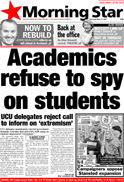 Academics refuse to spy on Muslim students
Academics refuse to spy on Muslim students
By Daniel Coysh
Morning Star, 31 May 2007
UCU delegates unanimously rejected government demands yesterday that university staff snoop on students suspected of “extremism.”
The repressive plans were universally condemned by the UCU inaugural congress in Bournemouth, which enthusiastically backed a motion calling on members to “resist attempts by government to engage colleges and universities in activities which amount to increased surveillance of Muslim or other minority students and to the use of members of staff for such witch-hunts.”
The massive vote endorsed the position initially adopted by the union at the end of 2006, when the plans were first mooted.
UCU general secretary Sally Hunt commented: “Delegates have made it clear that they will oppose government attempts to restrict academic freedom or free speech on campus. Lecturers want to teach students. If they wanted to police them they would have joined the force.”
In November, the government warned of what it described as the serious threat posed by radical Muslims and issued guidance to colleges and universities calling on them to monitor student activity.
But Ms Hunt added: “Lecturers have a pivotal role in building trust. These proposals, if implemented, would make that all but impossible. Universities must remain safe spaces for lecturers and students to discuss and debate all sorts of ideas, including those that some people may consider challenging, offensive and even extreme. The last thing we need is people too frightened to discuss an issue because they fear some quasi-secret service will turn them in.”
The motion, from the union’s transitional arrangements committee, expressed outrage at the “continuing demonisation of Muslim and other minority communities,” adding that this threatened to impinge on education.
It opposed the ethnic profiling of students and staff and pledged to challenge the “incursions of the security and immigration services to university and college campuses.” The union would also defend the right of members to refuse to co-operate with attempts to “transform education into an extension of the security forces.”
A separate motion, put forward by university lecturers in London, argued that increased surveillance of Muslims and other minority students amounted to a “witch-hunt.”
Presenting the motion, law lecturer at London Metropolitan University Mark Snaith said that academics were there to inform students not inform on them. “I teach law. I do not impose or enforce law, especially not bad legislation,” he added.
Seconding the motion, lecturer Mark Campbell said: “Our universities are not hot beds of Islamic extremism that need to be cowed. That message needed to be challenged.”
He cited the case of a student from Swansea who was arrested and treated as a suspected terrorist after taking a picture of Tower bridge. The reason for his arrest was because he possessed a book on Islamic jihad against the West, Mr Campbell said. But this book was on the reading list for one of his university courses, he explained.
UCU joint general secretary Paul Mackney said that staff had been asked to report if they heard anyone planning a bomb attack in the canteen. It was obvious staff would report the matter if they overheard such a thing, he said, but to their managers, not to MI5 officers.
The academics said that, although they would report illegal activity, they would not act as detectives. “The strong message from this congress must be we will not spy on our Muslim or any other students,” Mr Mackney added.
